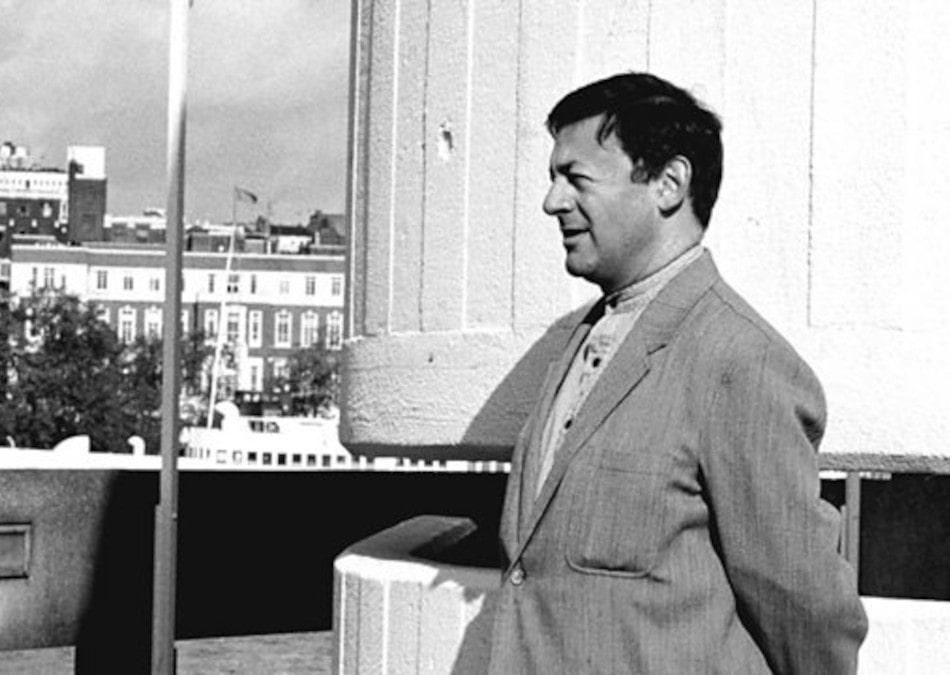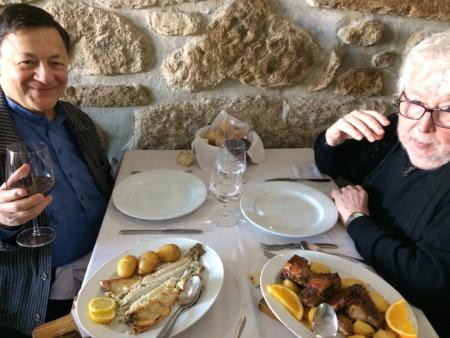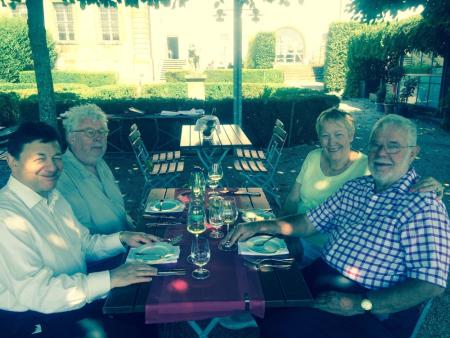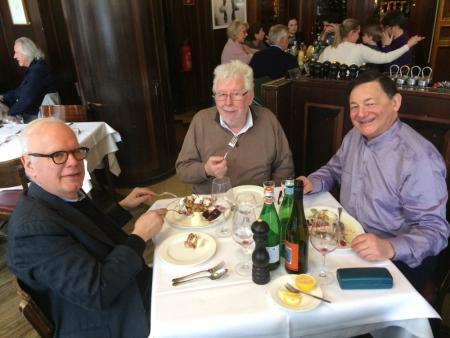Everyone at the London Sinfonietta is deeply saddened to learn of the death of Nicholas Snowman OBE, the co-founder of the London Sinfonietta. We offer his family and friends heartfelt condolences at this time.
Andrew Burke, Chief Executive & Artistic Director says on behalf of the organisation:
"This is a very sad news for the London Sinfonietta. With David Atherton, Nicholas created an organisation which from its early years had a profound effect on UK and world culture. David and Nicholas’ courage to imagine and launch the group led to generations of composers inspired to respond with great works that explored the new sonic possibilities of the post-war period. The format of London Sinfonietta itself has also inspired others to follow suit, with now many such ‘Sinfonietta’ sized contemporary ensembles around the world. Even after he formally left the organisation, Nicholas held the London Sinfonietta close to his heart and continued to look out for us right up to the present day. Everyone who has played with or worked for the London Sinfonietta over the years owes him a huge debt of gratitude and we will deeply miss him at our concerts and in conversation. We send our sincere condolences to his family and friends at what is a hugely difficult time."
Read obituaries in:
Or read some tributes from our staff and players below.
Memories of Nicholas
One of the most fortunate moments in my life was the day I met Nicholas Snowman. A fellow student at Cambridge reading English Literature, he was passionate about opera and asked me to collaborate with him in staging some semi-professional opera performances at the Cambridge Arts Theatre. His unrestrained, youthful vigour was matched by a formidable intellect and charismatic charm and wit that was difficult to resist. I readily agreed to be involved, one of my best life decisions.
Nicholas had big visions. Not for him some small-scale chamber opera, but the original version of Strauss’ Ariadne auf Naxos, complete with the accompanying Molière play Le Bourgeois gentilhomme and Strauss’ incidental music, a combination not seen in the UK for forty years. He arranged for me to hold casting auditions in London tapping into his many Glyndebourne contacts where, during the summer months, he had been acting as the assistant to Jani Strasser, the renowned Head of Music (33 years later he was to return as its General Director).
This wasn’t your typical university/student production. The main roles were taken by leading professionals, e.g. the lyric heldentenor, Alberto Remedios; quite how Nicholas persuaded them I’ll never know, in the same way that, looking back, I’ve no idea how he managed to raise sufficient funds to hire a working theatre for a week, staff it, fill it and pay enough expenses to engage some of the best London orchestral students to spend a week in Cambridge!
Thus began a professional partnership and lifelong friendship that was quite remarkable, each of us knowing the boundaries of our responsibilities and working together with precisely the same goals and aspirations.
Partly because of its rarity value, the original Ariadne caused something of a stir in the national press and, as a result, two further Cambridge productions were made possible. Once again we chose operas which badly needed revivals: Weber’s Oberon and Berlioz’s Beatrice and Benedict - happy times during which many lasting friendships were made, and, it must be said, reputations enhanced.
With Nicholas still working at Glyndebourne during the summer and I about to start at Covent Garden, I suggested a blueprint for what became the Sinfonietta. At that time promoters of contemporary music tended to have a kind of ghetto mentality, placing 6 or 7 new pieces side by side, played in front of the same tiny group of admirers, usually under-rehearsed and under-funded. I wanted to commission new works, but present them in the context of other twentieth-century pieces so that both the listeners and performers had points of reference and aural contrasts. They had to be comprehensively rehearsed with few limitations placed on the composers. Nicholas already had some theatre experience working with the New Opera Company and Alexander Goehr’s Music Theatre Ensemble, so he was no stranger to the contemporary music scene. Together we grabbed the bull by the horns, cajoled and persuaded anyone who would listen to give us support. Chief amongst them was Sir George Christie, Glyndebourne’s long-time Chairman, who listened very sympathetically and agreed to become the first Chairman of the Sinfonietta. We were off.
Nicholas was simply brilliant - a go-getter if ever there was one. He would never accept “no” for an answer. Our apartment, shared with our great friend, the phenomenal clarinettist Tony Pay, became the Sinfonietta’s first office; late nights and early mornings became the norm. A hive of activity. We knew that our opening event had to make a splash if we were to be taken seriously, hence I chose a spectacularly ambitious programme to include the first performance of Sir John Tavener’s The Whale, a school friend of Nicholas. Particularly as it was our debut, most administrators would have balked at the enormous cost, which included a professional chorus and around 90 performers, but Nicholas, unfazed, told me he’d make it work. Such faith! Prior to the concert we’d already approached the Arts Council for help based on a clutch of impressive reviews for our Cambridge operas, but there were no guarantees. Despite no firm promises from them, Nicholas was still buoyant and we ploughed on.
The Sinfonietta was born on 24 January 1968, and has never looked back. It would never have happened without Nicholas’ drive, intensity and sheer determination. From the outset, we agreed that rehearsal requirements would never be undercut, always aiming for the highest possible standards. I can’t remember a single occasion when my requests were rejected or severely compromised. Nicholas always found a way to cope.
Working hand in glove as we did and in such close proximity in those early days was, of course, a boon, a memory now to be cherished. Often it’s the heroes working in the background who receive little attention. Nicholas was one such hero. R.I.P. my friend.
David Atherton, London Sinfonietta co-founder
I have a tiny personal anecdote that kind of connects to my own path to contemporary music and working with the Sinfonietta: back in the late 1980s my family lived in Paris, and as a teenager already obsessed with modern music I was lucky enough to be introduced to Nicholas by Brian Dickie, a family friend who ran Glyndebourne in those days. One day Nicholas invited me to look around IRCAM with him, Boulez’s extraordinary research facility, and there I recognised and met a young George Benjamin for the first time (I’d seen him on a Southbank Show about Messiaen sometime before). George later invited me to the Sainte-Trinité in Paris where I heard Messiaen improvise and met him and Yvonne Loriod afterwards. It was all pretty overwhelming for a lad of 17 and significantly galvanised my desire to specialise in this area of music. At Oxford, I went on to study under Robert Sherlaw-Johnson, a leading authority on Messiaen in those days, alongside Kathryn Knight, who joined the London Sinfonietta Council a few years after me. I should mention that I tried but failed to get a job with the Sinfonietta after university but I’m here now! And I shall never forget those wonderful chance encounters back in the day.
Ben Weston, Music TV Producer and member of the London Sinfonietta Council
Nicholas and I have been close friends since we were eleven years old, so you can imagine what a terrible shock and great sadness it was to hear that he had died suddenly. As we are all aware, he made an invaluable contribution to the world of music. He was highly intelligent, knowledgeable, witty, charming, ambitious, at times a little overbearing perhaps, maybe even a bit pompous occasionally, but he had a great sense of humour and could laugh at himself as much as at others. It is probably these characteristics, taken together, which contributed to his successful career.
Rather than repeat the many tributes already paid to him by others more eloquent than me, I thought I would mention some moments relating to one of his other great passions – food. Nicholas would always have a three-course meal, even when the rest of us just wanted a quick snack. He was also a rather slow eater, a healthy trait, but it meant we were constantly hanging around waiting for Nicholas to finish. I remember in our school days, after lessons, we would sometimes pop into the local restaurant (the Cosmo). When it came to paying the bill, Nicholas would often conveniently ‘forget his wallet’, although he usually repaid his debts. Being an excellent fundraiser for good causes has always been one of his strengths! In the 1950s, meals at the homes of his parents and grandparents were legendary where, as a couple of precocious schoolboys, we would discuss our recently discovered interest in classical music, as well as cricket when the England team included figures like Len Hutton, Dennis Compton, Bill Edrich, Peter May, Godfrey Evans, Tom Graveney, and Freddie Truman.
Later in the decade we would queue for tickets on the day of a performance at Covent Garden and got to see some memorable productions from the gallery such as The Trojans conducted by Kubelik, Visconti’s production of Don Carlo with Vickers, Gobbi and Christoff, conducted by Giulini, and Tosca with Callas and Gobbi. At the time Nicholas’s parents would take us to a wonderful Italian restaurant in St Martin’s Lane called Brusa, as well as The Gay Hussar in Soho.
As we know, at Cambridge in the late 1960’s Nicholas and David Atherton formulated a plan to start an ensemble devoted mainly to the performance of 20th-century repertoire. Nicholas knew of my interest in entering the music business, and he invited me to become one of the founder members of the London Sinfonietta. It was here that I met some of the composers and other musicians that I would later manage. So, I owe Nicholas a debt of gratitude for this opportunity.
My last meal with dear Nicholas was just a few weeks ago. He was in tremendous form and excellent health. No one could have guessed what was to befall him so soon afterwards. He will be sadly missed by me as well as his many friends and colleagues all over the world.
Andrew Rosner
Published: 3 Mar 2023



